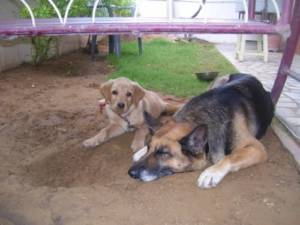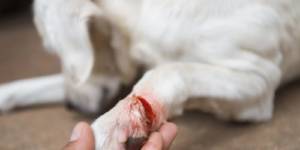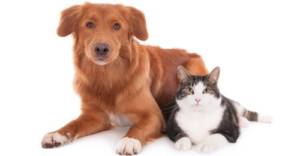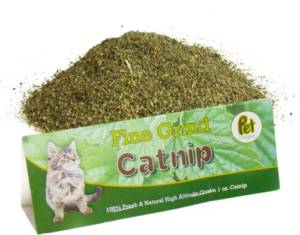If you have ever owned a cat, you must know what catnip is. Catnip is basically a fragrant green plant which is used to stimulate cats. You must have seen videos over the internet showing cats going nutty, showing drunken behaviour and going into a trance. The mint plant can be grown in your backyard and becomes a sort of an addiction for cats.
Just a sprinkle of catnip or ingesting a small amount of it can make cats crazy. They experience an unmatched bliss, and some cats even pass out after chewing on catnip. It’s safe to say catnip doesn’t have any adverse effects on cats. But what if your dog happens to bite a chunk of catnip?
It can be the case if you own both a dog and a cat. Many pet owners grow catnip in their backyard to stimulate their cats and give them more playtime. Who doesn’t like their pet to go on an overdrive fun ride? But your dog might have chewed on catnip while playing with your cat. Is it a situation to panic?
Effects of catnip on dogs – Quintessential Remedy
With an abundance of cases around the world, it’s confirmed that dogs also like chewing on catnip. Catnip has many health benefits in general with nutrients like Vitamin C, Vitamin E, Magnesium, minerals, flavonoids and tannins. Catnip also contains a good amount of essential oils. With a host of nutrients in its ingredients, catnip would definitely benefit dogs in some way. Here we discuss what happens if your dog eats catnip and how can it be used as a remedy.
-
Dog Becomes Sedentary –
In stark contrast to the stimulatory effect in cats, catnip makes your dog rather sedentary. It is in line with the typical behaviour of dogs and cats to react differently to different situations. While dogs are fun-loving animals, cats are usually grumpy and arrogant. Similarly, dogs love the stinkiest of smells while cats can identify the generally pleasant fragrances.

As catnip makes dogs sedentary, vets suggest its use as a sedative for dogs. It is a useful medicine for dogs getting nervous on the way to the vet for a regular health checkup. It calms his nerves and makes him feel drowsy.
-
Drains Excess Water –
Catnip acts as a diuretic for humans as well as dogs. The essential oils in catnip help drain out excess fluids from the dog’s body through urine. If your dog has accidentally ingested catnip, it’s normal if you see him urinate more often. If prescribed by the vet, catnip can help drain out excessive fluids and toxins like uric acids and waste from the dog’s body. While a small amount of urine can be ideal for a dog’s body, large amounts may affect him adversely as discussed further in this article.
-
Relieving Intestinal Problems –
Dogs are prone to suffering from intestinal problems like gastroenteritis, spasm and diarrhoea because of high protein foods pet owners make them eat. A small amount of catnip can be a remedy for intestinal problems. Dogs can get rid of flatulence by chewing catnip as it helps relieve gas.
You can also feed your dog catnip oil, catnip tea or directly from the plant to prevent him from vomiting. It can also reduce spasms and stomach cramps. Catnip is also used in cases of diarrhoea and dyspepsia as it has antispasmodic properties. Overall, it’s a wonderful home remedy for dogs suffering from intestinal problems. But it’s suggested to measure the dose of catnip as discussed further carefully.
-
Antiseptic Properties –
Catnip can heal open wounds as it contains thymol which acts as an antiseptic. You can apply catnip oil or freshly cut catnip over your dog’s injuries to treat them quickly. It also becomes a useful remedy on scratches, cuts or sores for dogs. Having a catnip plant at your home would benefit your cat as well as your dog.

The numerous health benefits make it an irresistible choice. Catnip also acts as a mosquito repellent for dogs and cats. It’s found to have better mosquito and insect repellent effects than gels available in the market. The versatile catnip plant is definitely an all-rounder that every pet owner would want to have. But does catnip not have any adverse effects on dogs?
Is Catnip Bad for Dogs?
While there are a few points to be discussed upon if catnip is terrible for your dog, it’s essential to know that catnip is by no means toxic for a dog. As a pet owner, you might be concerned if your dog goes on adrenaline or suffers from a heart attack, but be assured catnip will not have any severe effect on your dog.
The most catnip can do is upset your dog’s stomach. Yes, that’s right. While catnip treats many intestinal problems in dogs, you should only feed him on the advice of your vet. Eating a large chunk of catnip might upset your dog’s stomach resulting in runny stools, but that’s about it. There’s no side effect of significant concern.

Your dog also might start sneezing a lot after ingesting catnip. It will be a moderate session of sneezing and nothing extravagant. He won’t go down sick like he’s got cold, it’s more like a regular sneeze due to dust. The sneezing can be attributed to the dust around the place where you had kept the catnip. He also might get some catnip in his nose while chewing, so again it’s nothing to get worried about.
In case your dog has gotten sick after ingesting catnip, you might want to consult the vet. But the major reason behind sickness is his eating habits and not catnip itself. A lot of dog foods are dangerous for dogs and might get him sick. So, check up on his eating habits and stop worrying about catnip.
How can Dogs play with Catnip Toys?
While catnip isn’t harmful to dogs, there is no reason why you should give it to him without medical reasons. Catnip toys are designed for cats, but dogs are curious and might start playing with your cat’s catnip toys. The dog might start biting the toy and swallow other ingredients of the soft toy like fillings, squeakers and other tiny parts.
Catnip toys designed for cats are designed for small animals, and a big dog might swallow the whole thing. The ingestion of a foreign body might cause an obstruction in his digestive system leading to gastroenteritis. It may even demand surgery to remove the toy from his body.
The best way to prevent such hazards is to keep your cat’s catnip toys away from your dog. If you really want your dog to get a little more excited while playing with dogs, you can make customised catnip toys for him. Try sprinkling a little catnip on a rubber ball and give it to your dog. If you really want your dog to go on blissful adrenaline, try anise, the catnip’s alternative for dogs.
You can apply some drops of anise on any soft toy and give it to your dog to play with it. While a little amount of anise can compound the enjoyment, he derives from the toy, heavy doses can have adverse effects. It’s important to read the manufacturer’s instructions while buying the anise to know its potency. The dosage instructions are for a 70kg human so that you can calculate the dosage as per your dog’s weight.
How can Dogs have Catnip?
In case you are looking to give your dog catnip, there are some easy ways to do it. You should contact your vet about the dosage or decide yourself by the bodyweight of your dog. An easy way to feed catnip to the dog is by mixing an adequate dosage of catnip in his food. You can add the dosage to one of his meals rather than individually feeding him catnip.

It gets more comfortable if you have ground catnip available at your home. Ground catnip is readily available in the market, and you can just add it to the food. Don’t forget to mix it well before feeding your dog. If ground catnip is not available, you can also feed him by mixing his food with catnip oil.
Other than the food, you can also mix the adequate amount of catnip with water and let your dog drink the solution. The effects will be the same either ways and mixing with water just quickens up the process a bit. You can also sprinkle catnip spray on dog toys as discussed earlier. Don’t use catnip toys made for cats for this purpose and instead spray catnip on dog toys.
How much Catnip to give a Dog?
It’s important to discuss the reason for feeding catnip to your dog and deciding the dosage accordingly. Try to discuss with the vet on what do you want to achieve by giving your dog catnip, what problems are you looking to address and if your dog is already taking any other medications.
The vet will suggest if your dog needs catnip at all. An effective amount of catnip is anywhere around 1/2 to 1/4 teaspoon of catnip in every kg of dog food. Again, the vet would be able to judge better as to what is the correct dosage, the effects it can have down the line and if it is the right remedy for your dog.
Feeding excessive amounts of catnip can upset your dog’s stomach. It will render the health benefits of catnip ineffective and land you in a bit of trouble. If you’re looking to treat gastroenteritis in your dog with catnip, an overdose may compound the problem.
Safe way to give Dogs Catnip?
You can make a catnip tea which is completely safe for consumption for dogs. Just add a few drops of catnip liquid in his bowl of warm water and let the mint herb take its effects. Pet owners usually do this to treat dogs from nausea as the dog sneezes and clear up all the dirt from his nose. If you feed catnip tea to your dog while travelling, your dog will probably reach very fresh once you reach the destination.
Mixing ground catnip with your dog’s foods is also a safe option. Catnip oils in adequate amounts also do no harm to your pet. Even sprinkling catnip on your dog’s toys is a viable option. The problem arises only when you don’t abide by the dosage prescribed by the vet or try to take things in your own hands.
Does Catnip Affect Humans too?
The effects of catnip were thoroughly researched in the 1960s when some researchers thought it could replace marijuana as a drug to get high. Indeed, it’s cheap, legal and easy to make at home. It’s said that much earlier in the 1700s, people used to drink catnip teas to reduce anxiety and stress. Through the years, the thought of replacing marijuana remains a thought.
Unlike cats, humans don’t feel “high” after intaking catnip. Catnip contains an active chemical nepetalactone which stimulates cats and has a sedentary effect on dogs. But scientists haven’t yet found out why does it not affect humans. While humans don’t get intoxicated by catnip, some people claim that catnip tea does have a calming effect on humans.
But that doesn’t mean you should really go on to cut some catnip and make a cup of tea for yourself to feel relaxed. It’s better to seek medical advice from herbalists or your doctor before trying anything like that.
If you own a cat, you should avoid sipping on catnip tea as some cats are addicted to catnip. Your cat might try to lick your mouth and hurt you with her claws in that process. You should also watch out if your dog has just come back from your backyard where you grow catnip. Cats might harm him when they try to lick catnip from his paws.
Catnip is a great stimulator for dogs, it has a sedentary effect on dogs and isn’t recommended for humans. While catnips have proven benefits for cats, you should consider consulting the vet before giving it to your dog. Catnip does act as a remedy for some problems in your dog like gastroenteritis, acts as an insect repellent and can also act as a diuretic. So it’s worth consulting your vet if you can feed it to your dog to derive some health benefits.
Source:
https://www.healthypawspetinsurance.com/blog/2018/09/03/is-catnip-safe-for-dogs/amp
